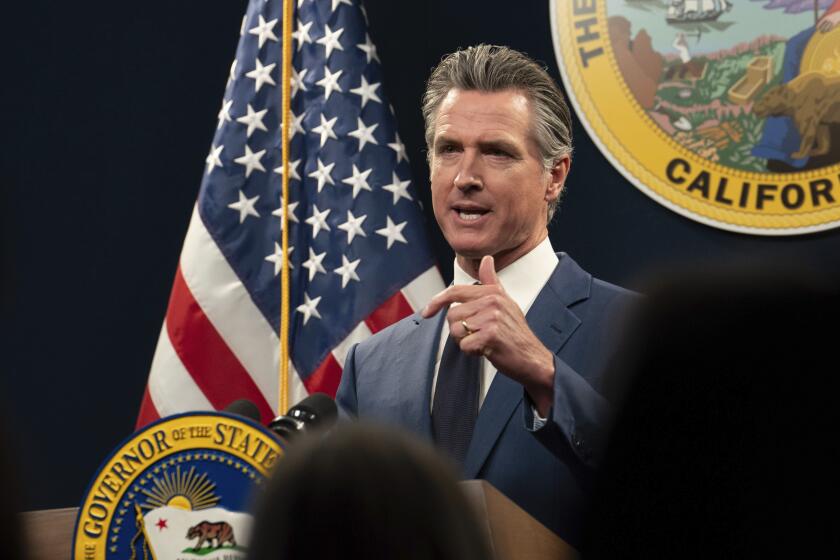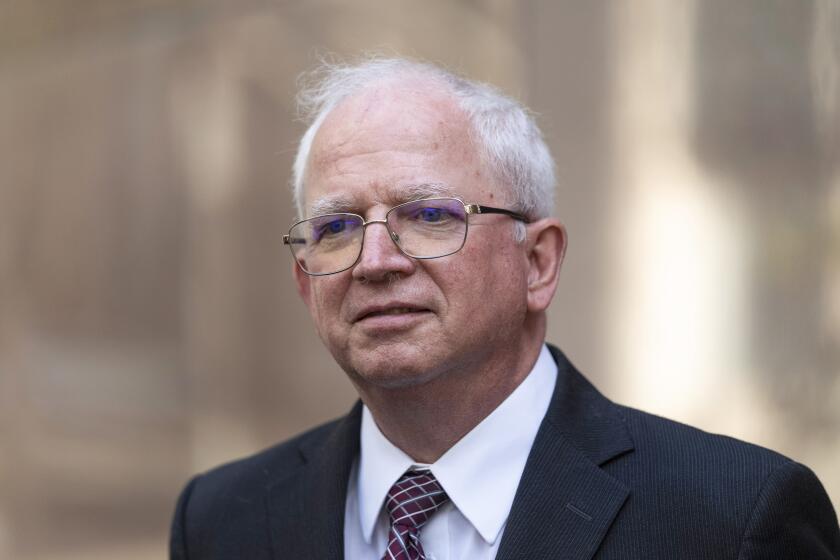Eco-Activists Sharpen Plans to Unseat Bush
In 2000, the Democrats picked a presidential nominee passionate about greenhouse gases, climate change and global energy policy.
But Al Gore also coveted the political center and so -- in the view even of some of his supporters -- he bit his tongue about his most heartfelt values, on the way to losing the election to George W. Bush.
Four years later, Sen. John F. Kerry has resolved to talk about the environment, but in a new way. He plans to steer clear of extended discourses on global warming and endangered species. Instead, the presumed Democratic presidential nominee is trying to connect with voters by talking about what his staff calls the “kitchen table” issues -- mercury-tainted cans of tuna appearing in family cupboards, air pollution worsening asthma for thousands of children and new gas wells pockmarking Western grasslands, leaving hunting grounds scarce of elk and pronghorn.
Aiding him in attempting to unseat President Bush will be an unusually organized and energized environmental community. Stereotyped by some as chanting, placard-waving zealots, environmentalists this year say they will attack Bush with a carefully targeted, multilayered campaign. Concentrating on a handful of swing states, they will take aim mainly at moderates, who aren’t typically part of their core constituency.
“Five years ago if you had asked the top 20 environmental leaders what the gravest threat to the environment was, they would have given a whole range of answers,” said Robert F. Kennedy Jr., son of the onetime attorney general and a lawyer for the Natural Resources Defense Council. “Today, they would be united in saying it’s George W. Bush.”
Republicans in the past have mainly tried to play defense on environmental issues, burdened by the long-held perception that they favor business over the environment. But Bush in recent weeks has aggressively stepped up his environmental profile -- proposing to expand, rather than merely preserve, endangered wetlands and to curtail harmful emissions from farm equipment and off-road diesel engines.
The politics of environmental regulation have generally remained on the periphery of presidential campaigns, with the economy and foreign affairs dominating the debate. A recent Gallup Poll found that Americans ranked the environment eighth on their list of concerns.
But with strategists in both parties expecting a close election, the environment is an issue that could expand in importance -- particularly in communities coping with contaminated water and dirty air. And some Republicans have warned that could work to their disadvantage.
“The environment is probably the single issue on which Republicans in general -- and President Bush in particular -- are most vulnerable,” Republican pollster Frank Luntz said in a memo last year.
Luntz added: “When our environmental policies are explained ineffectively, not only do we risk losing the swing vote, but our suburban female base could abandon us as well.”
Bush campaign strategist Matthew Dowd disputed Luntz’s view. He also said he expected the war on terror and the economy to hold sway with most voters. “When you have such huge differences on the two main issues,” Dowd said, “then that’s primarily what people are going to focus on.”
The Democratic focus on the environment is designed not just to combat Bush directly. The party also wants to stem the appeal of independent candidate Ralph Nader to eco-minded voters.
Kerry’s boosters argue that he can effectively cut off such “green flight.” They note his fight against Bush’s push for oil drilling in the Arctic National Wildlife Refuge and his 92% lifetime voting record from the League of Conservation Voters. The league gave the president an F -- in 34 years, its first failing mark.
On a recent campaign swing through the South, Kerry’s “kitchen table” approach to the environment was on full display.
“This is not just about picturesque coastlines. It’s not about saved whales,” Kerry said in the Mississippi River Delta hamlet of Shell Beach, La. “It’s about protecting our economy, our health and the places that we live.”
At an Earth Day appearance in Houston, the candidate was joined by a pediatrician who described the increase in childhood asthma in a city plagued by some of the nation’s dirtiest skies.
In many of his stump appearances, Kerry insists that cleaning the air and water can produce jobs, not kill them. He speaks about harnessing America’s top scientists -- as the United States did in World War II’s Manhattan Project to create nuclear weapons -- to accelerate the production of clean-fuel vehicles and cut the nation’s dependence on foreign oil.
Some of the nation’s largest environmental organizations say that in their efforts to help Kerry, they will eschew scattershot approaches of the past to reach voters in a more rigorous and personal way.
The League of Conservation Voters has formed a coalition with Defenders of Wildlife and Friends of the Earth that will target just four states -- Florida, New Mexico, Oregon and Wisconsin. All were closely contested in 2000 and are likely to be competitive again this year.
The coalition, named the Environmental Victory Project, has decided it can get more bang for its $6-million investment by deluging a few swing precincts in those states rather than financing television ads and mailers across the nation, said Mark Longabaugh, the League of Conservation Voters’ senior vice president for political affairs.
The coalition has begun dispatching 25,000 college students and others to precincts most prone to switching between Democratic and Republican candidates. These volunteers are to go door-to-door, telling voters how they believe Bush has harmed the environment. Two more in-person visits will follow before the Nov. 2 vote, to be augmented by mailers, phone calls and television ads, Longabaugh said.
“In Florida, we can’t run a $20-million television campaign,” Longabaugh said. “But by being very smart and precise ... we are trying to move 200,000 voters.... And that could decide the election.”
The Sierra Club will spend up to $10 million nationally to press the environmental case against Bush. The club also plans to lobby voters face-to-face in communities, such as Tampa, Fla., that the Environmental Victory Project will not.
The green-minded campaign workers will tailor their appeals to specific communities.
In Wisconsin, for instance, they will focus on mercury contamination from coal-burning power plants. The food chain has been so effected that the Food and Drug Administration this year warned that young children and nursing mothers should limit their consumption of tuna and other fish.
The environmental canvassers intend to remind voters that Bush loosened goals for reducing mercury emissions from power plants. The president’s handling of the policy drew wide criticism, even from a former Republican administrator at the Environmental Protection Agency, who called the lack of professional review of the change “outrageous.”
Environmentalists are confident they can tie Bush’s policies to a larger theme: favoritism toward corporate America.
According to a Times Poll in late March, he was seen by 63% of Americans as caring more about big business than about working people.
When told the president had adopted some environmentally friendly policies, 54% of voters said it was for political reasons, the poll found.
But Bush has fought back on the environmental front.
On Earth Day, for example, he went to Maine to declare that he would go beyond the Clinton administration’s goal of preserving wetlands to promote expanding the acreage of endangered estuaries and marshes. And last week, the Bush administration announced a regulation that within a decade would cut 90% of the harmful pollution from construction, farm and off-road diesel engines.
“I think now Bush has enough he’s done to go back out there and talk about the environment,” said Ed Goeas, a pollster for Republican candidates. “At worst it becomes a he-said, she-said situation, as opposed to him having no record and nothing to say.”
Times staff writer Julie Cart contributed to this report.
More to Read
Get the L.A. Times Politics newsletter
Deeply reported insights into legislation, politics and policy from Sacramento, Washington and beyond. In your inbox three times per week.
You may occasionally receive promotional content from the Los Angeles Times.







